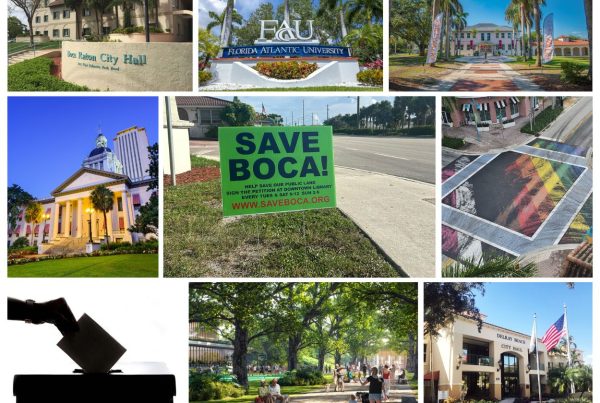Delray getting its house in order
Slowly but steadily, Delray Beach is trying to clean up the financial mess of the Auburn Trace housing complex and to make life better for those who live there.
The Federal Deposit Insurance Corp., just approved Delray Beach’s purchase from IberiaBank of the first mortgage on the 152-unit and the roughly 18 acres in the city’s southwest neighborhood. The FDIC had to sign off on the price because Iberia gave Delray a roughly $500,000 discount from the $4.7-million-plus price of the note.
City Attorney Noel Pfeffer said the closing must happen by May 29. Once it does, Delray Beach will be the lead creditor with a claim on Auburn Trace Ltd., the entity that owns and manages the complex. It is a subsidiary of Delray Beach-based Auburn Communities.
Twenty-six years ago, when a much different Delray Beach was trying to encourage any residential project, the city loaned the developer $3.84 million. With interest, the city’s stake is now between $4.2 million and $4.3 million.
As Pfeffer explained to the city commission four months ago, Delray Beach’s position as second mortgage-holder had become riskier. Iberia foreclosed on the property last fall because Auburn Trace Ltd., had not been making payments to the bank or the city. The developer then filed under Chapter 11 for bankruptcy protection.
Depending on how the bankruptcy plays out, Pfeffer said, Delray Beach—being secondary to the bank—could get less of its money or, in the worst case, the city could have its position “extinguished.” If Delray Beach is first in line, the city has much more protection, though Pfeffer acknowledged in January that the purchase is a “complex transaction with an uncertain outcome.” Auburn Trace also matters much more to Delray Beach than to IberiaBank, which has $16 billion in assets.
As long as the fate of Auburn Trace Ltd., remains uncertain, however, so will the outcome for Delray Beach and for residents of Auburn Trace. The developer’s latest move is a proposed sale of the project to Miami-based The Related Group. The company is best known for building luxury and market-rate condos—including SOFA 1 and 2 in Delray Beach—but it also has a large affordable housing department. Related’s Long Ha told me, “We’ve done several of these projects.”
According to documents submitted to the Palm Beach County Housing Finance Authority, Related—under an entity called PRH Investments—would buy Auburn Trace for $9.5 million. To make the purchase happen, the authority would authorize up to $9 million in financing that comes with what the authority’s executive director, David Brandt, says is a 4 percent federal tax credit that would provide between 20 percent and 25 percent of the equity. Last week, the housing finance authority board approved an “inducement resolution”—a placeholder action to make the financing available if the parties can work out a deal. Brandt said no government agency would be on the hook for the bonds, which private investors would buy.
The sale to Related, though, depends on Auburn Trace satisfying its creditors. That depends on making Delray Beach happy, and not just about money. As Mayor Cary Glickstein told me Wednesday, “This is also a public policy issue.” He means the welfare of Auburn Trace’s residents and the city’s wish for a safe, attractive project.
Auburn Trace’s first offer comes up way short on the money. I have confirmed that the developer offered Delray Beach $2.4 million, or roughly 60 percent of what Auburn Trace owes the city. Related would spend $25,000 in renovations on each Auburn Trace unit, and the complex would have gated access, among other improvements.
Auburn Trace’s attorney, Bradley Shraiberg, said the developer is “offering an alternative to (the city’s) proposed plan treatment” in the bankruptcy action, meaning the city’s purchase of the Iberia loan. Shraiberg stressed that “no plan has been approved for the debtor to solicit creditors. We are in the middle of that approval process.”
Not surprisingly, my sense from communicating with commissioners is that Auburn Trace has to raise that offer. “That’s obviously just a starting point,” Commissioner Jordana Jarjura said in an email. “If I were to support a deal, it would need to make the taxpayers whole and also address the poor conditions of the property.”
Pfeffer said Wednesday that he has other questions. The offer “needs context.” The city needs a “full understanding of the entire loan financing and the ownership entity.” Pfeffer said the city will “solicit added information.” It also appears that Auburn Trace wants to satisfy the Iberia loan at the price the city negotiated.
Delray Beach and the city’s bankruptcy lawyer, Robert Furr, didn’t hear until late last week about the possible sale to Related and the appeal to the Housing Finance Authority. The agency would have to approve the financing by June 30 because there’s only a certain amount available in this area of Florida for authorization by the end of the state fiscal year.
Surprises from Auburn Trace’s developer are not new. Sixteen months ago, the developer proposed on short notice that it give Delray Beach seven months of payment on the first loan—roughly $1 million—in exchange for the city granting a second loan of $4.3 million. That plan lacked even more details. A first commission vote approved it. A second rescinded it. This followed years of concessions to the developers, including the city subordinating its interest so Auburn Trace could get more financing.
Delray Beach’s exit strategy, Glickstein said, is “to protect the city’s position and not to be an operator” of a housing project. The city probably would love to have a company with Related’s resources renovate and run Auburn Trace. The developer’s plan for getting there, however, must align with the city’s interest.
Bernard is back
When the Delray Beach City Commission considered that earlier Auburn Trace proposal, lawyer/former state representative Mack Bernard argued for it. He was representing Auburn Trace. The city’s financial officer said it would have been a terrible deal for Delray Beach.
Yet as Bernard runs for the Palm Beach County Commission, Delray Beach is providing much of his early financing. Bernard raised nearly $35,000 in April, having declared his candidacy after District 7 incumbent Priscilla Taylor announced her intent to run for the northern Palm Beach County-Treasure Coast congressional seat of Patrick Murphy. He’s running for the U.S. Senate next year.
Roughly 40 percent of Bernard’s contributions in April were from Delray Beach. His law firm gave $1,000, as did Bernard’s wife. Through his Luna Rosa Restaurant and himself, Fran Marincola gave $2,000. City Commissioner Al Jacquet, a longtime Bernard ally, gave $1,000. So did former Delray Beach Mayor Tom Carney. Another $1,000 came from the developer of Atlantic Crossing and from the politically-connected Boca Raton law firm Weiss Handler & Cornwell.
One early question for Bernard is whether he lives in District 7. It’s a weird-looking thing, concentrated in central West Palm Beach and in Riviera Beach. Then it runs along the barrier island to Lake Worth, where it turns west to take in many minority neighborhoods south to Linton Boulevard. In 1988, when voters expanded the commission from five members to seven members, District 7 was added and drawn as a minority-access seat. An African-American has held it from the first election in 1990. Bernard is Haitian-American.
According to the Palm Beach County Property Appraiser’s Office, Bernard has owned a house in Delray Beach’s Bexley Park neighborhood since 2005. That house is outside District 7, according to the county’s map. That house, which is listed in the name of Bernard and his wife, is in District 4, which Steven Abrams represents.
Records also show that Bernard—in his name—last December bought a house in Boynton Beach just east of Interstate 95. That house is in District 7. The mailing address, however, is the house in Delray Beach.
Palm Beach County’s charter requires that commissioners live in the district they represent not just once they are elected but when they qualify to run. Bernard has qualified to run in District 7. Two calls to Bernard’s law office Wednesday were not returned by deadline.
County Administrator
Predictably, the county commission went with an inside candidate to succeed County Administrator Bob Weisman, who is retiring in August after 24 years.
That candidate is Weisman’s deputy, Verdenia Baker. She will become the county’s first female administrator and also the first African-American. Coming in second was Assistant County Administrator Shannon LaRocque.
Commissioner Steven Abrams, who represents Boca Raton, Delray Beach and surrounding areas, said Palm Beach is a “well-run county” whose administration “doesn’t need to be blown up,” despite what all who interviewed them agreed were the strong qualifications of the four outside candidates. Two commissioners had an outsider as their top choice.
Abrams ranked LaRocque first, not because of any problems with Baker—“Verdenia’s great”—but because “the main asset in that job is to be a problem-solver, and I’ve seen Shannon solve some of the most intractable problems we’ve had.” Abrams cited the county’s transit service for the disabled—since improved—the utility problems in the Glades that left residents drinking “brown water”—there’s now a regional water plant—and the convention center hotel—“which will open on time and under budget” after delays and infighting had set back the project for 15 years.
The smart move would be for Baker to name LaRocque her deputy. As Abrams pointed out, many of the county’s veteran administrators soon will be retiring. The county will need lots of institutional knowledge and problem-solving talent.
More election snafus
Sigh. Even the choice of Baker made Palm Beach County look yet again like the election screw-up capital of the country.
According to a memo from Assistant County Administrator Brad Merriman, the county’s search firm miscalculated the candidate rankings submitted by the commissioners. Priscilla Taylor ranked Baker first, not Michael Rogers. Fortunately, the mistake didn’t change the outcome. Baker still came out on top, but with four first-place votes, not just three.
So we’re talking embarrassment, not crisis. Still, November 2016 will be here soon enough.
••••••••
You can email Randy Schultz at randy@bocamag.com
For more City Watch blogs, click here.About the Author
Randy Schultz was born in Hartford, Conn., and graduated from the University of Tennessee in 1974. He has lived in South Florida since then, and in Boca Raton since 1985. Schultz spent nearly 40 years in daily journalism at the Miami Herald and Palm Beach Post, most recently as editorial page editor at the Post. His wife, Shelley, is director of The Learning Network at Pine Crest School. His son, an attorney, and daughter-in-law and three grandchildren also live in Boca Raton. His daughter is a veterinarian who lives in Baltimore.








